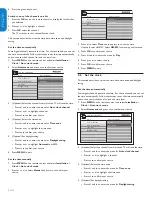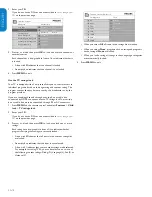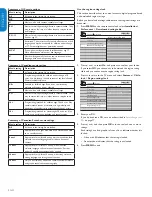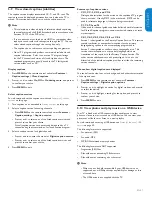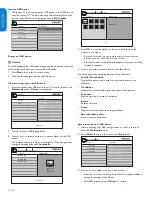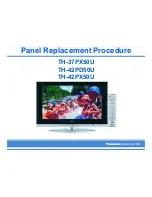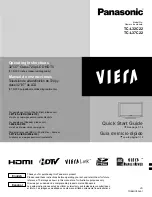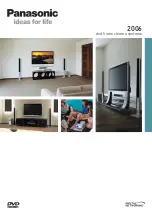
ENGLISH
FRANÇAISE
ESP
AÑOL
EN-7
Get started
3.
This section describes how to position and connect your TV, and how
to perform your first-time installation.
3.1 Position
the
TV
Warning
B
Do not insert the power plug into the wall socket before all the
•
connections are made.
Large screen TVs are heavy. Two people are required to carry and
•
handle the TV.
Before you move your TV, disconnect the cables to prevent
•
breakage.
Wherever you decide to position your TV, ensure that you always have
easy access to the power cord or plug to disconnect the TV from the
power.
If the TV is mounted on a swivel base or swivel arm, ensure no strain
is placed on the power cord when the TV is swivelled. Strain on the
power cord can loosen connections.
For ideal viewing conditions, position the TV where light does not fall
directly on the screen.
The ideal viewing distance for watching TV is three times its screen size.
Kensington security slot
Your TV is equipped with a Kensington Security Slot at the back of the
TV. If you connect an anti-theft Kensington lock (not supplied), position
the TV within reach of a permanent object that can be attached to the
lock.
3.2 Install the remote control batteries
Open the battery cover on the back of the remote control.
1.
Insert the 2 batteries supplied. Make sure the + and - ends of the
2.
batteries line up correctly (inside of case is marked).
Close the cover.
3.
Note:
D
If you are not going to use the remote control for a long time,
remove the batteries.
3.3 Connect the antenna or cable
This section describes how to connect your TV to an antenna, cable,
Direct Broadcast Satellite, and to a set-top box.
SERV. U
V
V
SPDIF
OUT
VIDEO
S-VIDEO
DV
D
D I AUDIO
D
D
IN
HDMI 3
HDMI 1
HDMI 2
AV 3
AV 1
AV 2
Y
Pb
Pr
L
R
L
R
L
R
Y
Pb
Pr
L
R
TV ANTENNA
Cable
Connect to an antenna
Any DTV programs that are broadcast in your area can be received for
free through an antenna connection.
Contact your local content provider or your local electronics retailer if
you are unsure about what HDTV programs are available in your area.
Broadcasters are transitioning from analog to digital TV. This means that
a given broadcaster can have channels available either in analog or in
digital, or both analog and digital at the same time.
The TV has stereo sound if the broadcasting channel makes it available.
Connect to a cable
When your TV is connected to the cable socket, you may receive
free digital and high definition programming (depending on your cable
provider). Digital and high definition cable channels can be recognized
by the format of the channel number. The channel number includes a
dot "." For example, 11.1, 46.30, 108.201. Contact your cable provider
for more information.

















